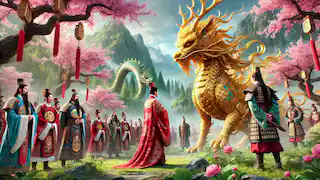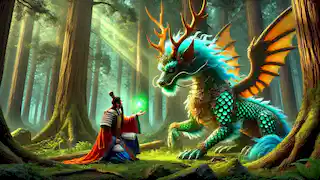In ancient Chinese mythology, the Qilin is a symbol of good fortune, peace, and prosperity, an ethereal creature whose appearance is said to herald the birth of a great leader or the coming of a sage. For centuries, stories of the Qilin have captured the imagination of the Chinese people, blending divine wonder with earthly wisdom. This tale weaves through the ages, where emperors, sages, and common folk alike encountered this magnificent being, experiencing firsthand the magic, serenity, and balance it brought to their world. Long ago, during the reign of Emperor Yao, one of China's legendary sage kings, the world was in harmony. The rivers flowed smoothly, crops flourished, and the people lived peacefully under the wise rule of their emperor. Yet, one night, as Yao stood on his palace balcony, gazing at the clear, moonlit sky, a brilliant light shot across the heavens. The court astrologers had foretold of a coming event, something that would signal the heavens’ favor. As the emperor marveled at the light, the great doors to his chamber burst open, and a messenger, breathless from running, fell to his knees. "Your Majesty!" the messenger exclaimed. "A creature—one that shines like gold and walks like the wind—has appeared in the far mountains!" Emperor Yao’s heart raced. The Qilin, a creature revered in legends, had been said to bring peace wherever it went. Could this be a sign of divine favor, of even greater prosperity for his people? Without hesitation, Yao ordered a procession to the mountains. His entourage, carrying banners of gold and red, marched toward the far-off lands where the beast had appeared. Upon reaching the foot of the mountains, a hush fell over the group. There, standing amidst the flowering trees, was a creature unlike any they had ever seen. Its body shimmered with a golden hue, its scales reminiscent of the most delicate jade, and its antlers, branching like the limbs of an ancient tree, glowed softly in the fading daylight. The creature was the Qilin. The people fell to their knees in reverence as the creature stood tall, unmoving yet majestic. Its large, intelligent eyes seemed to hold the wisdom of a thousand years. The air around it was still and sweet, as though the very essence of peace emanated from its being. "Your Majesty," whispered one of the emperor's advisors, "this is a sign. The Qilin only appears when the ruler is virtuous and the land is in balance." Emperor Yao approached the creature, bowing his head in humility. As he neared, the Qilin dipped its head in return, a gesture of mutual respect. It was then that Yao understood. His reign, though prosperous, was not eternal. The Qilin's appearance was not just a sign of present peace but of the need to prepare for the future—one in which his successors would continue to lead with wisdom and virtue. The Qilin turned gracefully and disappeared into the forest, leaving the people in awe. Its message was clear: the peace of the land depended on the continued righteousness of its rulers. Many centuries later, in the time of Confucius, the Qilin would make another fateful appearance. Confucius, the great philosopher, had dedicated his life to the pursuit of knowledge, justice, and moral integrity. By the time he had reached his later years, his teachings had spread far and wide, influencing scholars and leaders across the land. Yet, even in his wisdom, Confucius longed for a sign that his work had truly been in alignment with the heavens. One spring morning, as Confucius walked through a quiet grove near his home, he heard a soft rustling in the bushes. His steps faltered as the air grew still. From behind the trees, a creature emerged, its coat gleaming under the morning sun. It was the Qilin. Confucius stood in awe, tears welling in his eyes. The Qilin approached slowly, each step quiet and deliberate, as if it moved between worlds. When it stopped before the great sage, it knelt on the earth, lowering its majestic head. Confucius, overwhelmed, knelt as well, understanding the profound significance of this moment. "I have walked this path all my life," Confucius whispered, "seeking truth, seeking virtue. Is this your way of telling me that my work is done?" The Qilin raised its head, and for a moment, Confucius felt the weight of eternity in its gaze. In that instant, he understood that his teachings, though grounded in human affairs, were aligned with the cosmic order. The Qilin, a symbol of divine harmony, had come to confirm that Confucius's legacy would endure. When Confucius passed away years later, the Qilin was said to have been seen again, roaming the lands in quiet contemplation, as though mourning the loss of a kindred spirit. The creature’s connection to those who upheld righteousness and wisdom had become a central theme in the legends that spread after the sage's death. Wherever the Qilin went, peace followed, and the world would remember that it had appeared to the greatest thinker of their time. During the Han Dynasty, the Qilin became a symbol of the empire’s stability and moral foundation. Emperor Wu, a ruler known for his grand ambitions and military conquests, had heard the stories of the Qilin and longed to encounter the creature himself. In his heart, however, he knew that his reign had been marked by war and expansion, not peace and prosperity. He wondered whether he was worthy of the Qilin’s grace. As the years passed, Emperor Wu grew increasingly obsessed with finding the Qilin. He sent out expeditions to the farthest corners of the empire, to the mountains, forests, and rivers where the creature was said to roam. His courtiers whispered that the emperor's soul was restless, that his longing for the Qilin had consumed him. One autumn, a report came from the western provinces. A group of travelers claimed to have seen a creature that matched the description of the Qilin near a remote village at the edge of the empire. Emperor Wu, though aged and weary, immediately ordered his army to march. The journey was long and arduous, and many questioned whether the emperor’s quest was in vain. But Emperor Wu pressed on, driven by a desire to prove his worthiness to the heavens. When they finally arrived at the village, the people spoke of a creature that had appeared briefly before disappearing into the nearby forest. Emperor Wu, despite his fatigue, insisted on going into the forest alone. As he walked through the dense woods, the emperor felt a strange sense of calm wash over him. The wind rustled through the trees, and the air was thick with the scent of pine and earth. Suddenly, the trees parted, and there, standing amidst a grove of ancient oaks, was the Qilin. Emperor Wu fell to his knees, tears streaming down his face. He had spent his life building an empire, but it was in this moment, face to face with the embodiment of peace, that he realized what he truly sought. The Qilin did not judge him; it simply stood there, as still and eternal as the mountains themselves. The emperor remained in the forest for hours, silently communing with the creature. When he returned to his army, he was a changed man. He no longer sought the glory of conquest or the praise of men. Instead, he dedicated the remainder of his reign to fostering peace and unity within his empire. Though the Qilin was never seen again during Emperor Wu’s lifetime, its impact on his heart and his rule was profound. Under his guidance, the Han Dynasty flourished, not through war but through diplomacy and the cultivation of learning and culture. Centuries later, during the Ming Dynasty, the Qilin reappeared, this time to a simple farmer named Li Wei. Unlike the emperors and sages of the past, Li Wei was an ordinary man, known in his village for his kindness and hard work. He had never sought greatness, nor had he ever dreamt of encountering a creature from legend. One evening, as Li Wei returned from the fields, he noticed something unusual in the sky—a brilliant light, like a comet, streaking across the horizon. Curiosity piqued, he followed the light to a nearby hill, where he found the Qilin standing at the crest, its form bathed in the soft glow of the setting sun. Li Wei could hardly believe his eyes. The Qilin, with its jade-green scales and elegant antlers, was more beautiful than he had ever imagined. It stood still, watching him with eyes that seemed to see into his very soul. Without thinking, Li Wei knelt before the creature, unsure of what else to do. The Qilin moved closer, its hooves making no sound on the grass. To Li Wei's amazement, the creature lowered its head and gently nuzzled his hand. For what felt like hours, Li Wei remained there, in the presence of the Qilin, feeling a deep sense of peace and contentment wash over him. When the creature finally turned and disappeared into the woods, Li Wei returned to his village, forever changed. Though Li Wei never told anyone about his encounter, the village noticed a change in him. He became even more generous, always helping others without expecting anything in return. The crops in his fields grew taller and more abundant, and his neighbors came to him for advice, seeing him as a wise and compassionate man. Years later, when Li Wei passed away, the village elders told stories of the Qilin that had appeared to him, believing that it had chosen him for his pure heart and simple, honest life. And so, the legend of the Qilin continued, a reminder that greatness and virtue were not reserved for emperors and sages alone, but could be found in the humblest of souls. {{{_04}}} The story of the Qilin has transcended time, with each generation finding new meaning in its appearances. Whether seen by emperors, sages, or common folk, the Qilin remains a symbol of peace, purity, and divine favor. Its presence is a reminder that the greatest gifts are not material wealth or power, but wisdom, compassion, and harmony with the world around us. The Qilin walks the earth still, they say, appearing only when the world is in balance and the hearts of people are true. It may come in the form of a soft breeze through the trees, a quiet moment of reflection, or the sudden realization of a deeper truth. In these moments, we are reminded of the eternal guardian that watches over the world, guiding us toward a future of peace and understanding.The First Appearance

The Sage and the Qilin

The Emperor’s Quest

The Return of the Qilin
Conclusion: The Eternal Guardian
The Story of the Qilin
Reading Time: 10 min

About Story: The Story of the Qilin is a Myth Stories from china set in the Ancient Stories. This Descriptive Stories tale explores themes of Wisdom Stories and is suitable for All Ages Stories. It offers Moral Stories insights. A mythical creature that bridges the divine and the mortal, bringing peace and wisdom to ancient China.

















